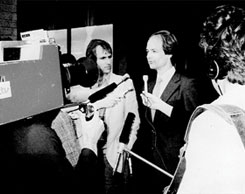Notable Cases
During the course of his career, Tony Serka has had many notable clients that have helped to shape his reputation as a leading criminal defence lawyer.
- Claire Wilson – Wilson was one of the participants in the B.C. Penitentiary hostage taking in 1973 as well as the “Cassidy Airport” escape in 1975.
- Connie Chartrand – Charged with the murder of a drug dealer who died with 186 stab wounds. Chartrand confessed to the murder twice to the R.C.M.P. but was acquitted by a Supreme Court Jury. Follow the day-by-day process of this intriguing trial by clicking on the dates. May 26, 1976, May 27, 1976, May 28, 1976, May 29, 1976, June 1, 1976
- Curtis Mason – A First Nations artist, Mason was charged with the murder of his roommate, Roland Montbriande, but was acquitted by a Supreme Court Jury.
- Regina v Robert Edison Andrews [1974] 15 C.C.C. (2d) 43 – Successfully applied for a writ of habeas corpus to discharge his client from custody before the Supreme Court of British Columbia arguing that under the Criminal Code, an accused person should not be deprived of his liberty simply because he has no immediate access to means to pay a fine.
- Challenged Vancouver’s “anti-hooker” by-law – In April,1982, Vancouver City Council passed an “anti-hooker” by-law. Serka was the first lawyer to challenge this law. When the prosecutor tried to circumvent Serka’s challenge by dropping the charges (i.e. entering a stay of proceedings), Serka argued that the City Prosecutor did not have the power to do so. Eventually, there was trial in which Serka on behalf of his client, Donald Woodbury, argued that the City of Vancouver did not have the constitutional right to pass by-laws on criminal matters, which came under the federal jurisdiction. The by-law was eventually rescinded after the Supreme Court of Canada ruled that a similar by-law was invalid because of a similar argument.
- In 1984 Serka, again was involved in the challenge of an injunction prohibiting prostitutes from conducting their business in the West End Streets of Vancouver. The injunction was granted but Serka launched an appeal. Before the appeal was heard in 1986 the Supreme Court of British Columbia injunction was lifted by the Province.
- The “Girl Guide/Beggar” Case – In 1989, Serka successfully argued an appeal before the County Court of British Columbia that “the downtrodden” (i.e. beggars) should not be prosecuted criminally as that would be akin to punishing the poor. Serka submitted that the poor should not be punished any more than Girl Guides selling cookies in front of a Government Liquor Store should be. Vancouver Sun “Panhandler Wins Appeal” November 8, 1989; “Beggar Like Girl Guides, Defence Lawyer Argues” October 21, 1989.
